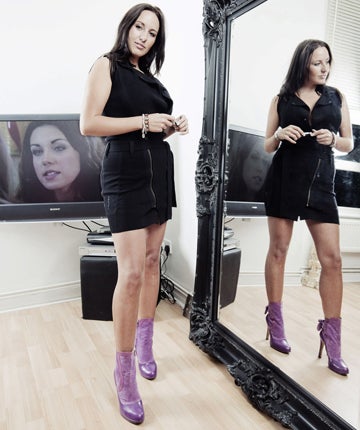Seven Days, Channel 4, Wednesday<br/>Gareth Malone's Extraordinary School for Boys, BBC2, Thursday
The kids aren't the problem, Gareth...

Your support helps us to tell the story
From reproductive rights to climate change to Big Tech, The Independent is on the ground when the story is developing. Whether it's investigating the financials of Elon Musk's pro-Trump PAC or producing our latest documentary, 'The A Word', which shines a light on the American women fighting for reproductive rights, we know how important it is to parse out the facts from the messaging.
At such a critical moment in US history, we need reporters on the ground. Your donation allows us to keep sending journalists to speak to both sides of the story.
The Independent is trusted by Americans across the entire political spectrum. And unlike many other quality news outlets, we choose not to lock Americans out of our reporting and analysis with paywalls. We believe quality journalism should be available to everyone, paid for by those who can afford it.
Your support makes all the difference.A breathless young woman called Laura asked her flatmate Samantha: "What do you think the public will make of me?" in the first instalment of Seven Days, as if she were about to sing at the Albert Hall rather than appear in Channel 4's new reality show.
But the makers of this docu-soap clearly hope Laura, Sam and the other dozen or so "highly engaging" participants (Channel 4's words) will so excite the nation's attention that viewers will suggest how they should act in future. So this is both a documentary, designed "to reflect the great diversity of Notting Hill", and a version of Big Brother without the incarceration.
In the course of an hour in which we saw little, and learnt less, about this district of west London, we got to know the characters' movements over the past week, without getting to know them. There was Hannah, a hard-faced interior designer, her mum Jan and her ex-boyfriend Dougal, who seems to live in a pub. Hannah and Jan giggled about the news of George Michael's prison sentence, as if to remind viewers how up-to-date the filming was. Laura and Sam spent their time finding French maid outfits to wear at their friend Karen's shoe-fashion evening. Unfortunately Laura told Karen (or was it the other way round?) that she thought her hair should be more glam, and Karen (or Sam) ended up crying in the loo.
Meanwhile Moktar, a Muslim student, first seen tut-tutting about the press coverage of burqas, was having doubts about tertiary education. "I can't see the point of getting a degree," he told friends, "if there's only a 54 per cent chance of getting a job." Perhaps concerned that he was about to throw away his chances, his mother arrived, to take him to university in person. A quartet of friends bragged about missed court appearances, and discussed the moral crux of whether or not to claim unemployment benefit. "When you look at it," said Javan, the deep thinker among them, "signing on, it's free money, innit?" And Malcolm, a resplendently dodgy customer with dyed-black dread-locks, tried to secure a bank loan to acquire a house for flat-conversion. "First, I need to find out more about you personally," said the chap at the bank. "I used to be the fastest plasterer in the world," offered Malcolm in an unusual attempt to establish his bona fides.
What will happen to this motley crew when the public starts to "interact" with them? Will Moktar be persuaded to ditch university and become a halal butcher? Will viewers tell Laura (or Sam, unless I mean Janet) to try an Amy Winehouse beehive? Will someone sign up Javan for a record deal? Could you honestly give a flying toss about any of them?
"Tomorrow is another day for these people," intoned the voiceover at the end. "Tell them what you think they should do next." Don't tempt me.
Back in the real, or at least the interesting world, at a primary school in Harlow, Essex, the British viewers' favourite teacher, Gareth Malone, concluded his bold attempts to raise the literacy standards of his charges over half a term, in preparation for a crucial Ofsted test in three weeks' time. Over the course of his Extraordinary School for Boys, we'd seen him try to instil manly competitiveness in the boys by holding classes in the open air, and playing boisterous games. Now he explained to a thunderstruck assembly, they'd put on a play at the 400-seater Harlow Playhouse – and they'd write it themselves.
"I think Mr Malone is nuts," said a small Molesworth emphatically. "Can you imagine having four hundred and six people right in front of you?" asked a stage-struck Tom Brown.
As the scholars constructed a moving drama about aliens looking for a home in the universe, the programme concentrated on three boys chronically unable to apply pen to paper. Tommy couldn't write more than five lines without giving up. Charlie was two years behind the others in reading, because his thoughts were locked in his head. Callum, a sulking malcontent, preferred to play the drums.
Gareth Malone, though, was equal to them all. By dint of subtle teacherly encouragement ("If you could do something better," he asked Charlie, "what would you like to be able to do?") and flagrant appeals to their egos, he turned Charlie into a small Arthur C Clarke, Callum into a proto-Robert Graves and Tommy into a suave and plausible anchorman. This was a lovely documentary, with a serious point – 21 days well spent.
Join our commenting forum
Join thought-provoking conversations, follow other Independent readers and see their replies
Comments